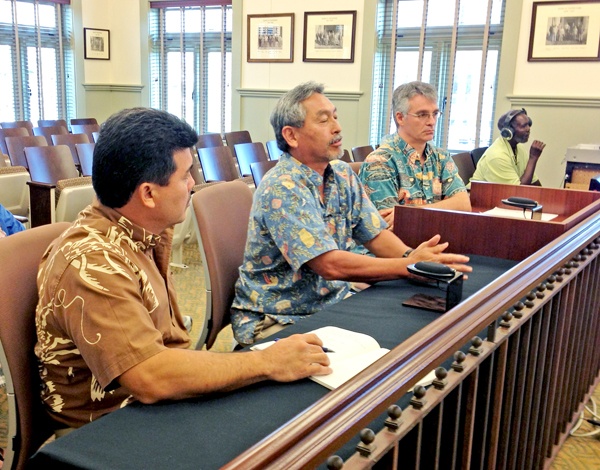LIHU‘E — County officials told the Kaua‘i County Council Wednesday an anonymous tip that sensitive documents may have been secretly buried at Kekaha Landfill is too broad, and an internal investigation produced no results.
“We did look into the request, we investigated it, as I know Finance (Department) did too,” said County Engineer Larry Dill, adding he was unable to come up with “any particulars about the particular incident.”
However, in response to Councilman Mel Rapozo’s request for the investigation, Dill said his department decided to tighten up the disposal of confidential documents.
“We are working on a policy to address any loopholes … that might exist,” Dill said.
Rapozo said he received a tip over a phone call that two Finance Department employees, using a county truck, drove into Kekaha Landfill, and with assistance from staff at Waste Management (the private company managing the landfill), buried banker boxes full of sensitive documents.
And none of this was logged by the county or landfill staff, he said he was told.
“I am not saying that the allegation is true,” Rapozo said. “But we need to validate or invalidate the allegation.”
But Rapozo was expecting a more thorough investigation from the administration, especially after Dill said he interviewed “some” employees at the landfill, but not all.
“We did do an investigation, perhaps not to the level that you were looking for,” said Dill, adding that it would have helped to get more specific information to follow up on, which wasn’t forthcoming.
Chair Jay Furfaro said is up to the administration to decide how to obtain more information, because the council is prohibited by County Charter to direct the administration on how to proceed on an investigation.
County Environmental Services Officer Donald Fujimoto said he looked at any kind of sensitive documents for the months of January and February, and no one knew of any situation.
But there is no requirement or policy regarding burying of sensitive documents, Fujimoto said. It is purely a service the county provides that has evolved through time, and the county does not assure that documents buried at the landfill will remain confidential, he said.
The Solid Waste Division’s main concerns are environmentally related, Dill said, and as far as disposing off of sensitive documents, “it’s really an informative policy” that helps other departments when getting rid of those documents.
“At the landfill, our mission is to make sure that waste that is disposed is done so in an environmentally responsible manner,” Dill said. “We are not a service to provide confidentiality for people for their documents.”
As far as “policy,” perhaps it is not the right word, Dill said. What the county can do is provide recommendations and options, because there are other opportunities for those with confidentiality concerns, he said.
The landfill is not a “confidential depository,” and the burden is on the disposer, Dill said, but there is nothing in writing assuring of this. In the policy that the administration is working on, the county would not assume any liability or assure any permanent confidentiality once something is buried in the landfill.
Furfaro said the “unwritten procedure” maybe should be written. Hawai‘i and Utah are the only two states in the nation that hold the innkeeper personally liable, he said.
From his nearly four decades of experience as a hotel manager, Furfaro said, every seven-year cycle, hotels dispose off their financial and innkeeper records, and the Solid Waste Division was always good in directing hotel staff to shred their documents and to have someone present during disposal.
Another issue was that the documents were allegedly in banker boxes, made of cardboard, which the landfill does not take, said Fujimoto, adding he would be the first one to welcome these types of call and do a follow-up. But the landfill still takes paper, and the administration is working on a bill that would address this, he said.
• Léo Azambuja, staff writer, can be reached at 245-0452 or lazambuja@ thegardenisland.com.





